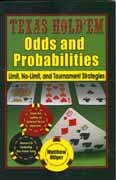
Texas Hold'em Odds and Probabilities
Not Paying Attention
Everyone likes to talk about reading your opponents, playing your opponent, etc but how can you do this if you are not Matthew Hilger is a professional poker player and respected author. In addition to the many articles on his own website, he writes columns for CardPlayer magazine, PokerPages.com and PokerinEurope.com. Matthew's next book, Texas Hold'em Odds and Probabilities: Limit, No-Limit and Tournament Strategies, will be released in June 2006. Matthew's website is www.internettexasholdem.com paying attention to the action at the table? A very common online mistake is not paying attention. This mistake can lead to numerable mistakes in important strategic decisions.
Matthew Hilger is a professional poker player and respected author. In addition to the many articles on his own website, he writes columns for CardPlayer magazine, PokerPages.com and PokerinEurope.com. Matthew's next book, Texas Hold'em Odds and Probabilities: Limit, No-Limit and Tournament Strategies, will be released in June 2006. Matthew's website is www.internettexasholdem.com paying attention to the action at the table? A very common online mistake is not paying attention. This mistake can lead to numerable mistakes in important strategic decisions.
Let’s first look at some of the common distractions which tempt online poker players:
·
· Talking on the phone
· Watching television
· Playing two tables
· Surfing the web
· Talking with your partner, friends, children, etc
One critical step to improving to an advanced level of play is creating an environment where you can focus on the action and your opponents. Identifying your opponent’s tendencies and playing accordingly is not an easy skill to learn and constantly requires your full attention.
It is very easy to play with a robotic playing style where you simply play your cards. You can even make money this way which is what many players do when playing multiple tables. However, this type of play will not mazimize your winnings nor will it help you grow as a poker player to give you the experience in making decisions based on each opponent’s tendencies. So create an environment which is conducive to improving your game.
What are some things you can do? Read your email before sitting down at the tables. Make sure that there is not a TV near the computer to tempt you. Don’t answer the phone! If possible, schedule your poker playing time outside the main social time of your family activities.
The consequences of not paying attention can be the difference between mediocre and advanced play. Let’s look at some examples. You are sitting in the cutoff with AJ offsuit and the player immediately before you raises first in. Normally this would be an easy fold against a “typical” opponent. However, what if this opponent has raised 7 out of the last 10 hands dealt at the table? If you didn’t notice this because of distractions you would simply fold but knowing you are against a maniac would be a strong case for a reraise. Other examples are not so evident and require more attention to identify.
For example, a particular player at your table never checkraises. He always bets out his strong hands or checks his weak hands. If you are paying attention, you can fold your mediocre hands when this opponent comes out betting and you can bet if he comes out checking. This is valuable information but it will not be too apparent unless you are paying close attention to the action at the table.
Next time you sit down at the table, pay attention for 10 minutes and then ask yourself some simple questions:
· Who is playing tight preflop and who is loose?
· Are there any aggressive loose players in the game?
· Who are the rocks postflop and who will draw to anything?
· Who are the top two players at the table?
Ten minutes is not very long so your first impressions might change but you must start building a story on each player as soon as you sit down at the table. Pay attention to the action and first learn how to identify basic tendencies of your opponents. Eventually you’ll be able to focus on more complex tendencies such as which opponents like to checkraise, which opponents like to slowplay, and which opponents like to semi-bluff. I often like to compare learning Hold’em to learning a foreign language. As soon as you feel like you’ve reached a plateau, something new will become obvious to you and your skills will jump to another level. So pay attention and develop your skills in reading your opponents to help you make better poker decisions.
The next article will look at Mistake #8: Bluffing Too Much

